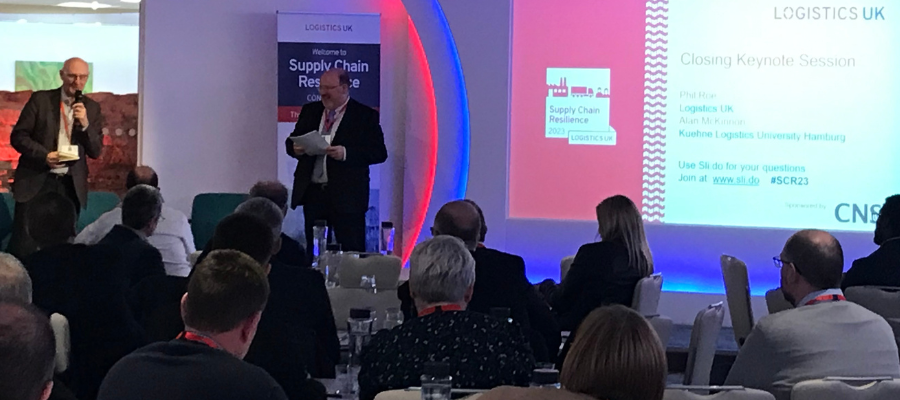🕒 Article read time: 2 minutes
Logistics UK conference captures the latest thinking on supply chain issues

More than 120 senior leaders from across the logistics industry packed into the America Square Conference Centre in the City of London last week (23 March 2023), for Logistics UK’s second Supply Chain Resilience conference.
Thirteen speakers and panellists from business, government and academia spoke on a range of topics connected to the issue of supply chain resilience, including recent developments, global risk, adopting a multimodal approach, ethics and decarbonisation, warehousing and attracting the next generation of talent.
Phil Roe, President of Logistics UK, assumed the role of conference chair. Welcoming delegates, he said: “It’s difficult to think of a subject matter that is more topical and is also going through so much change and re-evaluation than supply chain resilience.”
TRACKING TRENDS
Alan McKinnon, a Professor of Logistics at Kühne Logistics University in Hamburg, delivered the keynote address. He reported on the many new developments in the industry at three geographical scales – globally, at a European level and within the UK.
While the evidence suggests that the worst of the supply chain crisis of recent years is now over, several mega threats remain, McKinnon said, including the growing threat posed by cyber-attacks, during a period when logistics is undergoing a period of rapid digitalisation, the risk to global trade, the cost-of-living crisis and a rise in natural disasters and extreme weather events.
TRADING INSIGHTS
Following three panel sessions and a further four individual presentations by senior representatives from business and government, Roe and McKinnon closed the conference by reflecting on the day’s discussion.
It was possible to make a number of interconnections between the various sessions, McKinnon said.
“We began this morning by looking at cyber threats as one of the big risk factors, but then we went on to say that we’re going to be deploying an awful lot more IT to improve resilience through AI systems and machine learning,” he said, “Well, there’s a connection there, isn’t there?”
The potential danger was that the industry could put in place real-time systems to manage risks which were themselves vulnerable.
“We’ve got to be super careful that we don’t make that mistake,” he said.
On the discussion on climate change, McKinnon said that what hadn’t been mentioned was the fact that the IPCC (Intergovernmental Panel on Climate Change) had factored a huge amount of carbon dioxide removal into their models.
“If you talk to physicists and climate scientists, many of them are not persuaded that we will be able to do that at a planetary scale,” he said, “If those sceptics are right and we can’t do this, we are in deep trouble. Almost certainly we are going to be crossing the climatic tipping points and future generations will live on a very hostile planet. I see that as just a further incentive for us to do everything we can to cut emissions in the near future.”
FINAL THOUGHTS
In his summing up, Roe argued that because supply chain resilience had become such an issue, for the industry and the economy, the more it is examined the more of an issue it potentially becomes.
“We’ve become more concerned. There’s a spiral of worry that comes from that,” he said.
On skills, Roe warned delegates not to become complacent about any easing of the recruitment issues facing the sector.
“Perhaps we’ll create our own lack of resilience because we won’t have the people and we won’t have the skills as we go forward,” he said, “I just wonder if there’s a need for a bit of a mindset shift on this – to be more proactive and less reactive.”
With such a focus on resilience, McKinnon said it was probably worth exploring the semantics of the issue.
“Is this resilience we’re talking about or is it adaptation? Resilience can be the sense that you bounce back to some sort of previous state of normality, but the world is now such a turbulent place,” he said, “Therefore, we don’t go back, we go forward to some new situation.
“We really have to train the next generation of managers to live in a world that is probably going to be a lot less stable than the one that we’ve been used to in recent decades.”
*www.logistics.org.uk/scr
Published On: 30/03/2023 16:00:22

Comments Section
If you are a Logistics UK member login to add comments.